ANALYSIS: Fraud recycles the political dynasties and keeps them in power. It breeds generations of cheaters, corrupt politicians, mediocre executives, bribe takers, absenteeism in Congress. It is part of the lifeblood of bureaucrat capitalism.
By the Policy Study, Publication and Advocacy (PSPA)
Center for People Empowerment in Governance (CenPEG)
MANILA — Last week, the Arroyo administration’s Team Unity (TU) and the Genuine Opposition (GO) traded charges and counter-charges in connection with the latest surveys showing that fraud particularly vote-buying will take place in the coming May 14 elections. Two public opinion surveys, conducted separately on March 18-23 and April 14-17 by the Social Weather Stations (SWS), revealed that 40 percent of Filipinos expect the government to cheat in the elections while 70 percent expected vote buying to take place in their areas. TU leaders dismissed the surveys, especially the first, as fabricated accusing SWS of selling out to the anti-Arroyo opposition.
The results of the surveys should not be a surprise at all considering that elections ever since this republic was born � or even before that – have always been marred by fraud. Fraud, such as vote buying, distributing sacks of money to local politicians and poll officials, dagdag-bawas (vote padding and shaving), ballot snatching, fabricating election returns (ERs) and certificates of canvass (CoCs), violence and other types, takes place in any election, on all levels and by both pro- and anti-administration candidates. More stinking, however, is that it is usually the incumbent administration that commits it with all audacity and impunity.
Kontra Daya, the Parish Pastoral Council for Responsible Voting (PPCRV), Legal Advocacy Network for Clean Elections (LANCE), Legal Network for Truthful Elections (Lente), No Cheats and other poll watchdogs have proliferated in the aftermath of the 2004 election fraud. With a sense of disquiet but also sheer grit, they are all battle-geared for a widespread fraud and manipulation of the elections that are expected to escalate on election day. Some of these groups have chosen to monitor the Commission on Elections (Comelec), the constitutional poll body that has a very poor trust rating.
Daunting tasks
The tasks of the poll watchers have also become more daunting as they also need to monitor partisan activities of government agencies and of the Armed Forces of the Philippines (AFP) and Philippine National Police (PNP) whose top officials were linked to the 2004 election fraud. With only a few thousand volunteers, monitoring some 400,000 polling and clustered precincts where some 48 million voters will elect candidates for 18,000 elective positions is a formidable task as far as the poll watchers are concerned.
Last April, Kontra Daya (counter-fraud) exposed the presence of a private printing firm inside the National Printing Office (NPO) manufacturing election paraphernalia including ERs and CoCs. The private firm had been cited in the 2004 election fraud for its alleged role in printing fake ERs and CoCs. The Comelec said that the NPO was allowed to enter into a lease agreement with accredited private printers for the production of election paraphernalia. But the poll watch group said the secret printing smacked of a wholesale election fraud similar to the “clean up” operation in 2004 in which up to 10,000 election returns were fabricated and switched for the authentic ERs kept at the Batasang Pambansa complex.
In the provinces which have been lorded over by political dynasties, warlords and private armies, election-related killings are mounting as do reports of early vote buying. A top Cabinet official offered P10,000 for each barangay captain to ensure a clean sweep by the TU ticket in the senatorial polls in his home province. In another case, a House leader was reported to be campaigning for his son’s party-list group. Another Arroyo ally was reportedly distributing insurance policies; there were also accounts of teachers being bribed to foul up election results in favor of administration candidates.
In the congressional district and local elections – relatively insulated from the publicity glare that is currently focused on the senatorial race – flagrant violations of the omnibus election code are expected to take place. Here, days before the election bagmen travel often at night by choppers and vans to distribute payoff money in envelopes, bags and sacks to local officials and even election authorities. They end up in designated rendezvous like hotels, plush restaurants or in some remote bayside resort and dim-lit beer gardens where the recipients wait for the take with a promise to deliver the votes � authentic or otherwise.
2007 Elections








